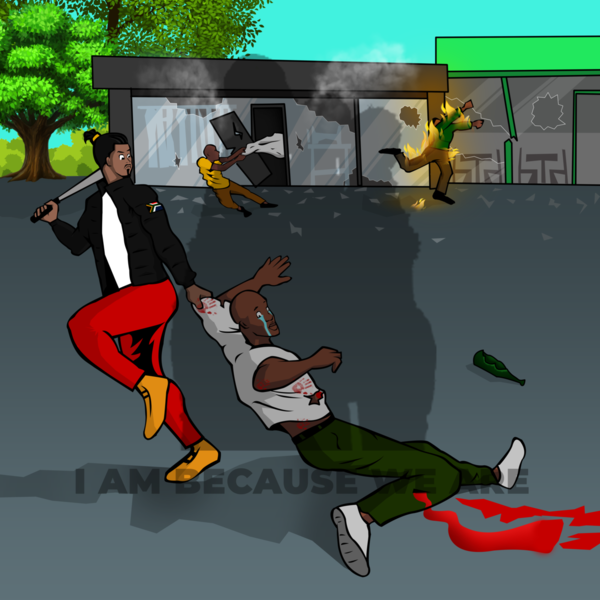South Afrikans,
You went against our sustenance. You violated Ubuntu. You failed in keeping to your end of our shared humanity. Xenophobia is alien to Afrika. In its literal sense, xenophobia translates to fear of foreigners. The word xenophobia is of Greek origin. Xenophobia is foreign to Afrika. You appropriated xenophobia to waste the life of your people. You took ownership of something that does not belong to you, all to destroy the little economic strides your people were making. You acted on the grounds of xenophobia, a concept that has no bearing on our shared suffering while going against a principle planted in your backyard. “You are because we all are” is the cornerstone of Ubuntu. Whether this has any meaning or validity to you, the xenophobic violence in South Africa desecrates our shared humanity.
I first preached Ubuntu at Xavier University during a spoken word at an African Student Association Gala event in 2017. “Being who we are through each other” was my memory verse. I don’t mean to get scriptural with you. To put it another way, it became a refrain in my mind. The spoken word was a point of healing. Some students targeted Xavier University black students a few months prior. You were not there when a white student painted her face black. “Who needs white when black lives matter” was the caption which undermined our long-suffering. You also were not there when someone dressed a skeleton in a dashiki, a symbolic Afrikan attire—flooding back terrible memories of the American lynch mob. These racial occurrences are typical in an anti-black society. Xavier University is America. You are not familiar with America. You do not know that in America, black lives do not matter. And now in South Africa, South Afrika, of all places, you mean to tell me that black lives also do not matter?
You are not in the diaspora to witness the anti-black sentiment the world over. I must tell you that Afrikans, particularly black Afrikans, are the most despised people on the planet. This statement is not meant to bring about self-pity. In the main, it is the black experience. You ought not to trivialize self-respect. You might ask what I mean. My point is: if you do not value yourself, your own people will not value you. What more from the loveless world?
A sense of an Afrikans’ self-worth is a requisite condition for liberation so delayed, and so sought after. In the brutal assault on fellow Afrikans, I saw the horrific scenes making rounds. Back in 2008, Ernesto Alfabeto Nhamuave from Mozambique was burned alive. You did not come to his aid. You watched while the fire consumed him. South Africa’s judicial system never charged anyone for Ernesto’s murder, an assault on justice, another precious black body destroyed, and forgotten. In the recent September attacks, black-owned shops were looted, vandalized, and burned. These vulnerable black peoples’ offense was making a living through menial jobs despite continental hardships. Afrikans scampered to save their lives from the violence.
These attacks happened and continue to occur in a continent that has experienced and continues to experience collective oppression. Where is your conscience? Have you lost a sense of your history? I thought you were a better Afrikan than what you showed. People whose future depends on one another would not conspire to wipe each other out. Yet you see the reverse is proving to be the case. These attacks against black people have become common in South Africa. They were soft targets. The attacks were against Afrikans, who could not defend themselves. The perpetrators would not have attempted these attacks on policed, white, affluent neighborhoods or cities where black elites who are monopoly capital collaborators live—refusing to address growing economic inequalities.
South Africa birthed Ubuntu to the world, but the original enclave of the tenet is in the blood of its people. How can we talk about Ubuntu without speaking to our dignity as a people? “Being who we are through each other” reminds me of an Afrikan’s worth. The world watched as we shed our blood and tore ourselves down in Gauteng Province, Durban, Mpumalanga, Johannesburg, and other townships or regions. There was no collective angst or condemnation. We should pull ourselves together and ask why this is so. Harm to self supports the myth that Afrikans are destructive. At the same time, xenophobia eliminates an Afrikan people so despised.
You seem to have forgotten Nelson Mandela’s campaign. The fight against Apartheid had undeniable elements of Afrikan solidarity. Afrikan nations rallied around South Africa—lending moral and financial support. Not allowing you to walk a journey alone exemplifies Ubuntu. But now you have chosen to betray the path that we threaded together. I ask you not to deceive yourself by believing that South Africa is an island onto itself. I also plead with you not to be under any illusion that Afrikans are foreigners in the southernmost part of Afrika. For this is the danger, we all face.
You know South Africa, I do not. You are approximately four-fifths of the South African population, yet you don’t own your land. The predicament of black South Africans applies to all Afrikan nations. We have not recovered from the colonial experience. You can never defeat your oppressive travails if you continue to hate. Nelson Mandela reminded us: “For to be free is not merely to cast off one’s chains, but to live in a way that respects and enhances the freedom of others.” I must tell you from the bottom of my heart: the xenophobic attacks dishonor our shared past and plight. My soul is heavy. Xenophobia endangers us. It goes against Ubuntu, a fundamental principle that we recognize. Alas, we can never be free as Afrikans unless you are free from hating us, a part of you.
Yours Truly,
EZE

